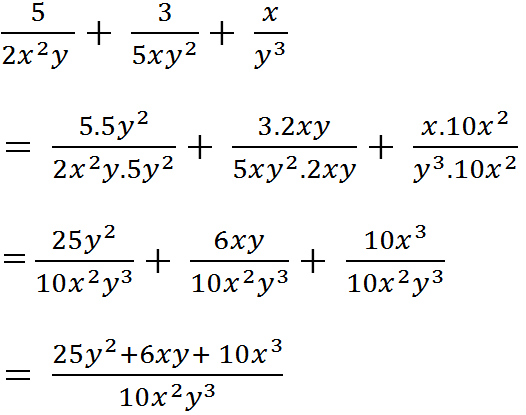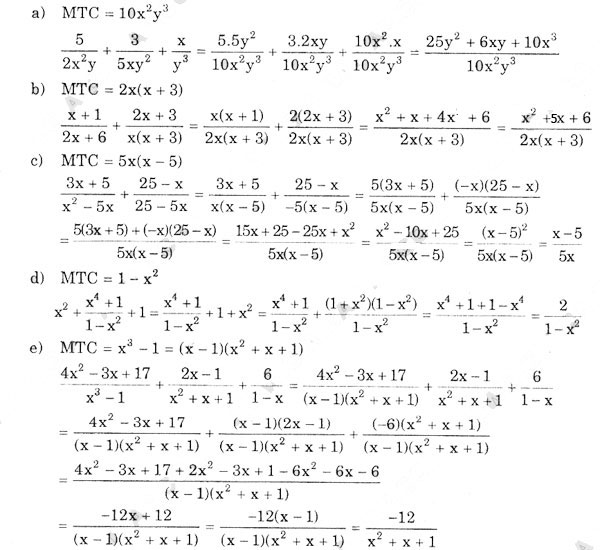Hãy nhập câu hỏi của bạn vào đây, nếu là tài khoản VIP, bạn sẽ được ưu tiên trả lời.

1
a) x^2+2x-5 b) x^2+x+7 9 (dư 8)
2
x=2; x = -(3*căn bậc hai(7)*i+1)/2;x = (3*căn bậc hai(7)*i-1)/2;
3
a=2

\(\dfrac{x}{x-1}-\dfrac{2x}{x^2-1}=0\left(ĐKXĐ:x\ne\pm1\right)\\ \Leftrightarrow\dfrac{x\left(x+1\right)}{\left(x-1\right)\left(x+1\right)}-\dfrac{2x}{\left(x-1\right)\left(x+1\right)}=0\\ \Rightarrow x^2+x-2x=0\\ \Leftrightarrow x^2-x=0\Leftrightarrow x\left(x-1\right)=0\\ \Rightarrow\left[{}\begin{matrix}x=0\\x-1=0\Rightarrow x=1\left(loại\right)\end{matrix}\right.\)
vậy phương trình có tập nghiệm là S={0}.
b)
\(\dfrac{\left(x+2\right)^2}{2x-3}-1=\dfrac{x^2+10}{2x-3}\left(ĐKXĐ:x\ne\dfrac{3}{2}\right)\)
quy đồng và khử mẫu phương trình trên, ta được:
\(\left(x+2\right)^2+3-2x=x^2+10\\ \Leftrightarrow x^2+4x+4-2x-x^2=10-3\)
\(\Leftrightarrow2x+4=7\Leftrightarrow2x=7-4=3\Rightarrow x=\dfrac{3}{2}\left(loại\right)\)
vậy phương trình đã cho vô nghiệm.
c)\(\dfrac{x+5}{x-5}-\dfrac{x-5}{x+5}=\dfrac{20}{x^2-25}\left(ĐKXĐ:x\ne\pm5\right)\)
\(\Leftrightarrow\dfrac{\left(x+5\right)^2}{\left(x-5\right)\left(x+5\right)}-\dfrac{\left(x-5\right)^2}{\left(x+5\right)\left(x-5\right)}=\dfrac{20}{\left(x+5\right)\left(x-5\right)}\)
\(\Rightarrow\left(x+5\right)^2-\left(x-5\right)^2=20\)
\(\Leftrightarrow x^2+25x+25-x^2+25x-25=20\\ \Leftrightarrow50x=20\Rightarrow x=\dfrac{2}{5}\)
vậy tập nghiệm của phương trình là \(S=\left\{\dfrac{2}{5}\right\}\)
d)\(\dfrac{3x+2}{3x-2}-\dfrac{6}{2+3x}=\dfrac{9x^2}{9x^2-4}\left(ĐKXĐ:x\ne\pm\dfrac{2}{3}\right)\)
quy đồng và khử mẫu phương trình trên, ta được:
\(\left(3x+2\right)^2-6\left(3x-2\right)=9x^2\\ \Leftrightarrow9x^2+12x+4-18x+12-9x^2=0\\ \Leftrightarrow16-6x=0\Leftrightarrow6x=16\Rightarrow x=\dfrac{16}{6}\)
vậy tập nghiệm của phương trình là \(S=\left\{\dfrac{16}{6}\right\}\)
e)\(\dfrac{3}{5x-1}+\dfrac{2}{3-5x}=\dfrac{4}{\left(1-5x\right)\left(5x-3\right)}\left(ĐKXĐ:x\ne\dfrac{1}{5};\dfrac{3}{5}\right)\)
quy đồng và khử mẫu phương trình trên, ta được:
\(3\left(3-5x\right)+2\left(5x-1\right)=4\\ \Leftrightarrow9-15x+10x-2=4\\ \Leftrightarrow-5x=-3\Rightarrow x=\dfrac{3}{5}\left(loại\right)\)
vậy phương trình đã cho vô nghiệm.
f)
\(\dfrac{3}{1-4x}=\dfrac{2}{4x+1}-\dfrac{8+6x}{16x^2-1}\left(ĐKXĐ:x\ne\pm\dfrac{1}{4}\right)\)
quy đồng và khử mẫu phương trình trên, ta được:
\(-3\left(4x+1\right)=2\left(4x-1\right)-8-6x\\ \Leftrightarrow-12x-3=8x-2-8-6x\\ \Leftrightarrow-14x=-7\Rightarrow x=\dfrac{1}{2}\)
vậy phương trình có tập nghiệm là \(S=\left\{\dfrac{1}{2}\right\}\)
g)
\(\dfrac{y-1}{y-2}-\dfrac{5}{y+2}=\dfrac{12}{y^2-4}+1\left(ĐKXĐ:y\ne\pm2\right)\)
quy đồng và khử mẫu phương trình trên, ta được:
\(\left(y-1\right)\left(y+2\right)-5\left(y-2\right)=12+y^2-4\\ \Leftrightarrow y^2+y-2-5y+10=12+y^2-4\\ \Leftrightarrow-4y+8=8\Leftrightarrow-4y=0\Rightarrow y=0\)
vậy phương trình có tập nghiệm là S={0}
h)
\(\dfrac{x+1}{x-1}-\dfrac{x-1}{x+1}=\dfrac{4}{x^2-1}\left(ĐKXĐ:x\ne\pm1\right)\)
quy đồng và khử mẫu phương trình trên, ta được:
\(\left(x+1\right)^2-\left(x-1\right)^2=4\\ \Leftrightarrow x^2+2x+1-x^2+2x-1=4\\ \Leftrightarrow4x=4\Rightarrow x=1\)
vậy phương trình có tập nghiệm là S={1}.
i)
\(\dfrac{2x-3}{x+2}-\dfrac{x+2}{x-2}=\dfrac{2}{x^2-4}\left(ĐKXĐ:x\ne\pm2\right)\)
quy đồng và khử mẫu phương trình trên, ta được:
\(\left(2x-3\right)\left(x-2\right)-\left(x+2\right)=2\\ \Leftrightarrow2x^2-7x+6-x^2-4x-4=2\\ \Leftrightarrow x^2-11x=0\Rightarrow\left[{}\begin{matrix}x=0\\x-11=0\Rightarrow x=11\end{matrix}\right.\)
vậy phương trình có tập nghiệm là S={0;11}
j)
\(\dfrac{x-1}{x^2-4}=\dfrac{3}{2-x}\left(ĐKXĐ:x\ne\pm2\right)\)
quy đồng và khử mẫu phương trình trên, ta được:
\(x-1=-3\left(x+2\right)\Leftrightarrow x-1=-3x-6\\ \Leftrightarrow4x=5\Rightarrow x=\dfrac{5}{4}\)
vậy phương trình có tập nghiệm là \(S=\left\{\dfrac{5}{4}\right\}\)

Câu 2:
ĐKXĐ: \(\left[{}\begin{matrix}1-9x^2\ne0\\1+3x\ne0\\1-3x\ne0\end{matrix}\right.\Rightarrow \left[{}\begin{matrix}x\ne\dfrac{-1}{3}\\x\ne\dfrac{1}{3}\end{matrix}\right.\)
\(\dfrac{12}{1-9x^2}=\dfrac{1-3x}{1+3x}-\dfrac{1+3x}{1-3x}\left(1\right)\)
\(\left(1\right):\dfrac{12}{\left(1-3x\right)\left(1+3x\right)}-\dfrac{\left(1-3x\right)\left(1-3x\right)}{\left(1-3x\right)\left(1+3x\right)}+\dfrac{\left(1+3x\right)\left(1+3x\right)}{\left(1-3x\right)\left(1+3x\right)}=0\)
\(\Leftrightarrow 12-\left(1-3x-3x+9x^2\right)+\left(1+3x+3x+9x^2\right)=0\)
\(\Leftrightarrow 12-1+3x+3x-9x^2+1+3x+3x+9x^2=0\)
\(\Leftrightarrow12x+12=0\\ \Leftrightarrow12x=-12\\ \Leftrightarrow x=-1\left(TM\right)\)
Vậy \(S=\left\{-1\right\}\)

Bài 1:
a) Ta có: \(2,3x-2\left(0,7+2x\right)=3,6-1,7x\)
\(\Leftrightarrow2,3x-1,4-4x-3,6+1,7x=0\)
\(\Leftrightarrow-5=0\)(vl)
Vậy: \(x\in\varnothing\)
b) Ta có: \(\frac{4}{3}x-\frac{5}{6}=\frac{1}{2}\)
\(\Leftrightarrow\frac{4}{3}x=\frac{1}{2}+\frac{5}{6}=\frac{8}{6}=\frac{4}{3}\)
hay x=1
Vậy: x=1
c) Ta có: \(\frac{x}{10}-\left(\frac{x}{30}+\frac{2x}{45}\right)=\frac{4}{5}\)
\(\Leftrightarrow\frac{9x}{90}-\frac{3x}{90}-\frac{4x}{90}-\frac{72}{90}=0\)
\(\Leftrightarrow2x-72=0\)
\(\Leftrightarrow2\left(x-36\right)=0\)
mà 2>0
nên x-36=0
hay x=36
Vậy: x=36
d) Ta có: \(\frac{10x+3}{8}=\frac{7-8x}{12}\)
\(\Leftrightarrow12\left(10x+3\right)=8\left(7-8x\right)\)
\(\Leftrightarrow120x+36=56-64x\)
\(\Leftrightarrow120x+36-56+64x=0\)
\(\Leftrightarrow184x-20=0\)
\(\Leftrightarrow184x=20\)
hay \(x=\frac{5}{46}\)
Vậy: \(x=\frac{5}{46}\)
e) Ta có: \(\frac{10x-5}{18}+\frac{x+3}{12}=\frac{7x+3}{6}-\frac{12-x}{9}\)
\(\Leftrightarrow\frac{2\left(10x-5\right)}{36}+\frac{3\left(x+3\right)}{36}-\frac{6\left(7x+3\right)}{36}+\frac{4\left(12-x\right)}{36}=0\)
\(\Leftrightarrow2\left(10x-5\right)+3\left(x+3\right)-6\left(7x+3\right)+4\left(12-x\right)=0\)
\(\Leftrightarrow20x-10+3x+9-42x-18+48-4x=0\)
\(\Leftrightarrow-23x+29=0\)
\(\Leftrightarrow-23x=-29\)
hay \(x=\frac{29}{23}\)
Vậy: \(x=\frac{29}{23}\)
f) Ta có: \(\frac{x+4}{5}-x-5=\frac{x+3}{2}-\frac{x-2}{2}\)
\(\Leftrightarrow\frac{2\left(x+4\right)}{10}-\frac{10x}{10}-\frac{50}{10}=\frac{25}{10}\)
\(\Leftrightarrow2x+8-10x-50-25=0\)
\(\Leftrightarrow-8x-67=0\)
\(\Leftrightarrow-8x=67\)
hay \(x=\frac{-67}{8}\)
Vậy: \(x=\frac{-67}{8}\)
g) Ta có: \(\frac{2-x}{4}=\frac{2\left(x+1\right)}{5}-\frac{3\left(2x-5\right)}{10}\)
\(\Leftrightarrow5\left(2-x\right)-8\left(x+1\right)+6\left(2x-5\right)=0\)
\(\Leftrightarrow10-5x-8x-8+12x-30=0\)
\(\Leftrightarrow-x-28=0\)
\(\Leftrightarrow-x=28\)
hay x=-28
Vậy: x=-28
h) Ta có: \(\frac{x+2}{3}+\frac{3\left(2x-1\right)}{4}-\frac{5x-3}{6}=x+\frac{5}{12}\)
\(\Leftrightarrow\frac{4\left(x+2\right)}{12}+\frac{9\left(2x-1\right)}{12}-\frac{2\left(5x-3\right)}{12}-\frac{12x}{12}-\frac{5}{12}=0\)
\(\Leftrightarrow4x+8+18x-9-10x+6-12x-5=0\)
\(\Leftrightarrow0x=0\)
Vậy: \(x\in R\)
Bài 2:
a) Ta có: \(5\left(x-1\right)\left(2x-1\right)=3\left(x+8\right)\left(x-1\right)\)
\(\Leftrightarrow5\left(x-1\right)\left(2x-1\right)-3\left(x-1\right)\left(x+8\right)=0\)
\(\Leftrightarrow\left(x-1\right)\left[5\left(2x-1\right)-3\left(x+8\right)\right]=0\)
\(\Leftrightarrow\left(x-1\right)\left(10x-5-3x-24\right)=0\)
\(\Leftrightarrow\left(x-1\right)\left(7x-29\right)=0\)
\(\Leftrightarrow\left[{}\begin{matrix}x-1=0\\7x-29=0\end{matrix}\right.\Leftrightarrow\left[{}\begin{matrix}x=1\\7x=29\end{matrix}\right.\Leftrightarrow\left[{}\begin{matrix}x=1\\x=\frac{29}{7}\end{matrix}\right.\)
Vậy: Tập nghiệm \(S=\left\{1;\frac{29}{7}\right\}\)
b) Ta có: \(\left(3x-2\right)\left(x+6\right)\left(x^2+5\right)=0\)(1)
Ta có: \(x^2\ge0\forall x\)
\(\Rightarrow x^2+5\ge5\ne0\forall x\)(2)
Từ (1) và (2) suy ra:
\(\left[{}\begin{matrix}3x-2=0\\x+6=0\end{matrix}\right.\Leftrightarrow\left[{}\begin{matrix}3x=2\\x=-6\end{matrix}\right.\Leftrightarrow\left[{}\begin{matrix}x=\frac{2}{3}\\x=-6\end{matrix}\right.\)
Vậy: Tập nghiệm \(S=\left\{\frac{2}{3};-6\right\}\)
c) Ta có: \(\left(3x-2\right)\left(9x^2+6x+4\right)-\left(3x-1\right)\left(9x^2-3x+1\right)=x-4\)
\(\Leftrightarrow27x^3-8-\left(27x^3-1\right)-x+4=0\)
\(\Leftrightarrow27x^3-8-27x^3+1-x+4=0\)
\(\Leftrightarrow-x-3=0\)
\(\Leftrightarrow-x=3\)
hay x=-3
Vậy: Tập nghiệm S={-3}
d) Ta có: \(x\left(x-1\right)-\left(x-3\right)\left(x+4\right)=5x\)
\(\Leftrightarrow x^2-x-\left(x^2+x-12\right)-5x=0\)
\(\Leftrightarrow x^2-x-x^2-x+12-5x=0\)
\(\Leftrightarrow12-7x=0\)
\(\Leftrightarrow7x=12\)
hay \(x=\frac{12}{7}\)
Vậy: Tập nghiệm \(S=\left\{\frac{12}{7}\right\}\)
e) Ta có: (2x+1)(2x-1)=4x(x-7)-3x
\(\Leftrightarrow4x^2-1-4x^2+28x+3x=0\)
\(\Leftrightarrow31x-1=0\)
\(\Leftrightarrow31x=1\)
hay \(x=\frac{1}{31}\)
Vậy: Tập nghiệm \(S=\left\{\frac{1}{31}\right\}\)





a: \(\Leftrightarrow x\left(16-x^2\right)+x^3-125=3\)
=>16x-125=3
=>16x=128
hay x=8
b: \(\Leftrightarrow x^3+3x^2+3x+1-x^3+3x^2-3x+1-6\left(x^2-2x+1\right)=-10\)
\(\Leftrightarrow6x^2+2-6x^2+12x-6=-10\)
=>12x-4=-10
=>12x=-6
hay x=-1/2
c: \(\Leftrightarrow x^3-27+x\left(4-x^2\right)=1\)
\(\Leftrightarrow4x-27=1\)
hay x=7